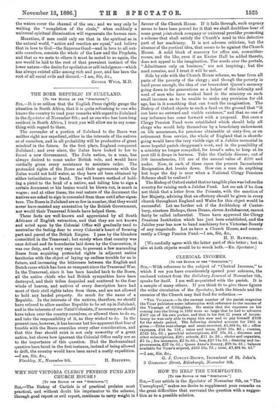THE BOER REPUBLIC IN ZULITLAND.
[To Tam Horton or THR "SpscTATos.."J
SIR,—It is so seldom that the English Press rightly gauge the situation in South Africa, that it is quite refreshing to one who knows the country to read your remarks with regard to Zululand in the Spectator of November 6th ; and as one who has been long resident in South Africa, I trust you will allow me to say some- thing with regard to them.
The surrender of a portion of Zululand to the Boers was neither right nor expedient, either in the interests of the natives or of ourselves, and in all probability will be productive of great mischief in the future. In the first place, England conquered Zululand ; and ever since, the Zulus have looked to her to found a new Government. The Zulu nation, to a man, has always desired to come under British rule, and would have cordially given every assistance to maintain order. The pretended rights of the Boers and their agreements with the Zulus would not hold water, as they have all been obtained by either intimidation or fraud. The well known method of hold- ing a pistol to the head of a native, and telling him to sign a certain document or his brains would be blown out, is much in vogue ; and at other times, the real nature of the document the natives are asked to sign is concealed from them until after signa- ture. The Boers in Zululand are so few in number, that they would never have resisted any annexation by the British Government, nor would their Transvaal friends have helped them.
These facts are well known and appreciated by all South Africans of English extraction, and that they are not known and acted upon by the Colonial Office will gradually tend to neutralise the feeling dear to every Colonist's heart of forming part and parcel of the British Empire. I pass by the blunders committed in the Transvaal; but surely when that country was once defined and its boundaries laid down by the Convention, it was our duty, and a very easy one, to prevent a few marauding Boers from acquiring pretended rights in adjacent native territories with the object of laying up endless trouble for us in future, and increasing the bitterness between the English and Dutch races which has been so rampant since the Transvaal War. In the Transvaal, since it has been handed back to the Boers, all the native chiefs who had British sympathies have been destroyed, and their tribes despoiled and scattered to the four winds of heaven, and natives of every description have had most of their civil rights taken from them, and are not allowed to hold any landed property. So much for the name of a Republic. In the interests of the natives, therefore, we should have refused to allow another Republic to be set up in Zululand, and in the interests of our Natal Colonists, if necessary,we should have taken over the country ourselves, or allowed them to do so, and take the responsibility of it, as they wished to do. In the present case, however, it has become but too apparent that fear of trouble with the Boers overrides every other consideration, and that this fear should exist is not only unworthy of a great nation, but shows how ignorant the Colonial Office really are as to the importance of this question. Had the Bechuanaland question been faced in the first instance, instead of being allowed to drift, the country would have been saved a costly expedition. —I am, Sir, &c.,


































 Previous page
Previous page